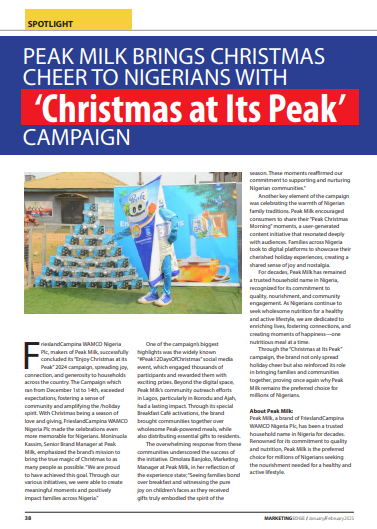By Tunde Animasaun
The Integrated Marketing Communications sub-sector is unarguably one of the industry’s most affected by the economic fallout of Covid-19 pandemic and the strictures attendant to the global health challenge. This is because marketing/advert budget is the first to be axed whenever an organisation is shedding extraneous expenses.
To help companies navigate their ways out of the challenges occasioned by the pandemic, Campaign, a U.K based global business media brand serving the marketing, advertising and media communities, and Deltek, a software and information solutions company carried out a survey on more than 300 agency professionals around the world about how they’re faring in the pandemic and their expectations for the year ahead. The results of the survey are very educative as they ‘provide insights for all those seeking to emerge from the current uncertainty with a stronger, more resilient and more future-proof business’.
The survey, which covered some key business fundamentals in IMC such as agency-client relationship, agency productivity and profits, current challenges and how agencies and clients are responding, agency teams, talent and pay packets, what agencies are focusing on – and where they need to improve and digital transformation – and the journey to achieving it, came up with useful insights for agencies that are desirous of navigating successfully out of the troubled waters of the Covid-19-induced disruptions in the global business environment.
In terms of the agency-client relationship, many agencies reported surprisingly positive experiences in terms of client numbers as the majority have either retained the same number of clients as they had 12 months ago (36%) or actually grown their client base (44%). “This was actually a healthier picture than at the start of 2020, when nearly a quarter of agencies (23%) reported losing clients”.
This positive development may, according to the survey, be due to the fact that “existing client contracts may have remained in force for much of the year; but in any case, clients may be reluctant to make an agency change in the midst of so much other upheaval. Global research by ID Comms finds that in the initial pandemic disruption, 69% of agency leaders have seen normal pitching processing put on hold. Meanwhile a UK survey by Alchemis finds the majority of clients are less likely to consider alternative marketing agencies during the pandemic, and have grown closer to the incumbents – who have often re-imagined campaigns with considerable resourcefulness”.
On the local scene, the picture is a bit different. Some of the ways employed by brands to cut expenditure impacted directly on the business of agencies and firms in the IMC. These measures include creating in-house agencies, re-negotiating extant retainerships, introducing hybrids and outright cancellation.
According to Yomi Badejo Okusanya, Group Managing Director of CMC Connect, Year 2020 was a challenging year for many businesses in Nigeria. Taking his company as a case study, he said: “Those of us that are in the consulting part of the business know that retainership is our desire because it gives stability; it helps to plan adequately and also helps to move things forward. We, for instance, had to accept significant drops in our retainership and in some cases, there were changes around the budget and all of these have significantly been affecting our business and the business of the client.”
He said further: “We have seen that many of the clients we are speaking to now or re-negotiating with, or with whom we are negotiating afresh are shying away from the retainership. They are asking for more. Many of them have come up with hybrids. So, what we did was to put some on retainer and some on project basis.”
Furthermore, the research reports that agencies appear to be working hard and stretching themselves to retain their client base. “The majority (61%) are now offering more services than they did a year ago”. The increased job does not, however, lead to higher profit margins. This diversification may reflect agencies’ adaptability and willingness to do more for clients in the Covid-19 era. Nigerian agencies suffer the same fate as many of them had to work more for less pay.
On ‘current challenges and how agencies and clients are responding’, the survey confirmed the obvious fact that the pandemic brings with it many operational challenges for agencies especially in resource management (a problem for 64%); collaboration (47%) and client relationships (43%).
In terms of how clients are responding to 2021, the picture is mixed. While as many as 40% of agencies say their clients have a renewed sense of confidence; a third disagrees with this view. As regards adspend, around half (51%) say their clients are planning to maintain spend levels in 2021, a similar number (49%) think client spend will decrease. Just one in five (23%) predict increased client spend. This suggests caution, uncertainty and the predominant ‘wait and see’ attitude.
Another pertinent talking point was the outlook that 2021 holds for agency workforces. The findings again show that over a third (39%) expect their team to expand in 2021 while a similar number (36%) foresee no change. Close to a fifth (16%) anticipate their team shrinking (though few expect job losses of more than 30%). Similarly, agency professionals are not necessarily counting on a raise in 2021. While over a quarter (29%) expect pay per head to increase, the majority (58%) anticipate no change, and more than one in 10 (13%) expect pay decreases.
The foregoing, notwithstanding, is evident that the integrated marketing communications industry has been impacted by the global crisis in no small measure. However, beyond the challenges, the time has come to begin to see, explore and exploit the prospects inherent in these challenging times. Communication is vital in two ways: from agency to client and from agency to consumers. As much as the digital revolution is here to stay, we should endeavor to use and create the right mix of the major media channels (digital, social media, television, radio) not forgetting the more traditional and personalised channels such as the telephone, emails or text messages. This communication strategy is particularly right for B2B (Business-to-Business) companies with a database of loyal clients, who can be contacted regularly through a phone call or a personalised email.
Listening to customers and answering their questions, being proactive and flexible may be the skill that set the winners and losers apart. Companies have to listen because they want to offer their best customer service, even when they are not able to sell or serve products. Moreover, because customers are looking for support, they need to feel understood even if their needs cannot be met immediately.






Comment
No comments found.